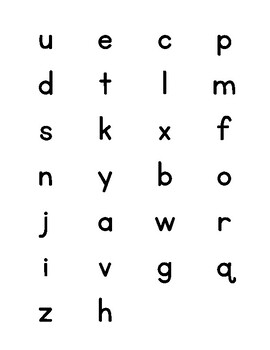
A few years ago I wrote a post, which offered a compilation of FREE literacy resources for parents and professionals. Today I would like to expand upon my previous article by providing professionals with a compilation of free literacy assessment tools.
Assessment tools tend to be expensive. Few professionals have unlimited budgets to purchase the myriad of tests needed to appropriately assess a host of skills associated with reading, spelling, and writing. Below is a list of helpful free materials to assist SLPs on tight budgets testing children with suspected reading, spelling, and writing deficits.
First, let us briefly review a few essential components involved in skilled reading, which are:
- Phonological and Phonemic Awareness Skills
- Phonological awareness assessment/intervention has predictive power until 2nd grade. After that it does not add information to the prediction of 4th-grade reading abilities (Hogan, Catts, & Little, 2005) unless the student continues to present with significant reading challenges as evident via sound blending deficits (Kilpatrick, 2012)
- Orthographic Mapping Abilities
- Formation of letter-sound connections to bond the spellings, pronunciations, and meanings of specific words in memory
- Explains how children learn to read words by sight, to spell words from memory, and to acquire vocabulary words from print
- Enabled by phonemic awareness and grapheme-phoneme knowledge (Ehri, 2014)
- Semantic Knowledge
- Vocabulary manipulation
- Morphological Knowledge
- Knowledge and manipulation of affixes
- Rapid Naming Abilities
- Rapid automatized naming (RAN) and not phonological awareness has been found to be a consistent predictor of reading fluency in all orthographies (Landerl, et al, 2019).
- Poor rapid automatized naming abilities (on alphanumeric and nonalphanumeric tasks) have been found to be a long-term and universal symptom of reading deficits (Araújo & Faísca, 2019)
- Rapid automatized naming (RAN) and not phonological awareness has been found to be a consistent predictor of reading fluency in all orthographies (Landerl, et al, 2019).
- Reading Fluency
- Rate
- Accuracy
- Prosody
- Reading Comprehension
- Gestalt processing
- Background knowledge
- Inference making
- Grasp of text structure
- Grasp of literary devices
Here are some FREE evidence-based free resources I found online that target the assessment of the above skills:
Nonword Repetition:
Phonemic Awareness:
- The PAST Test –The Phonological Awareness Skills Test (PAST) is an informal, diagnostic, individually administered assessment tool to help teachers determine the point of instruction for students and to monitor progress.
- Advanced Phonemic Awareness Skills (Younger Group)
- Advanced Phonemic Awareness Skills (Older Group)
Letter Identification:
- Letter Identification and Sounds Assessment -a tool to assess a child’s progress with letter naming and sounds throughout the school year. The same assessment can be given as a pre-assessment and then as a post-assessment, or a second assessment has been provided to be used at the end of the school year
- The Letter Identification Test (LIDT) tests a person’s letter identification knowledge.
- The Letter Sound Test (LeST) tests a person’s ability to sound out single letters and letter combinations.
- The Letter Position Test (LETPos) assesses children’s ability to assign positions to letters. While this test can be used with all children.
- Indicadores Dinámicos del Exito en la Lecturaare are a set of research-based procedures and measures for assessing the acquisition of early literacy skills from kindergarten through third grade for students learning to read in Spanish. IDEL is similar to DIBELS, which measures early literacy skills in English.
Single-Word Reading
- The Castles and Coltheart 2 (CC2) tests different processes in single-word reading
- The Diagnostic Reading Test for Nonwords (DiRT) tests a person’s knowledge of letter-sound correspondences at the word level.
Morphology:
The Diagnostic Spelling Test – Morphology (DiST-m) assesses a person’s ability to apply morphological regularities in spelling. The DiSTm assesses the spelling of some of the most commonly used suffixes (e.g., past tense -ed) and some very consistent morphologically-based spelling rules.
Rapid Naming:
Reading Fluency:
- Reading Fluency Assessment (For grades 1-8)
- Reading Fluency Norms (Hasbrouck & Tindal, 2017)
- Multidimensional Fluency Scale -rubric (1-4) which rates reader fluency in the areas of expression and
volume, phrasing, smoothness, and pace. - Reading Prosody Checklist
Reading Comprehension:
- The Test of Everyday Reading Comprehension (TERC) tests how well students 6-12 years of age understand what they read in everyday life.
- Reading Comprehension Assessment Compilation
Spelling:
- The Diagnostic Spelling Test for Nonwords (DiSTn) tests how well a person knows the sound-letter rules in English.
- The Diagnostic Spelling Test for Irregular Words (DiSTi) tests how well a person can spell irregular words.
- The Diagnostic Spelling Test – Sounds (DiSTs) tests if a person can represent some of the very frequently occurring sounds in the English language using the appropriate letter(s).
- The Test of Orthographic Choice (TOC) tests a person’s written word recognition. In this test, the reader is shown two written items that sound the same (e.g., doar door).
Writing:
Miscellaneous:
The Macquarie Oxford Reading Anxiety Test (MoRAT) is a questionnaire that measures a person’s level of reading anxiety.
This free resource is a good tool for older SLPs looking for a refresher in planning for testing. Thank you.
Thank you so much for this wonderful resource. School-based SLPs are always on a tight budget and having an array of quality free resources is not only a plus but a must in a school setting! I am a big fan of your products and have purchased many over the course of the past two years. It is also an asset to have one single place to go for all these resources. It completely cuts down on time looking up information for evaluations!
Best,
Lynette